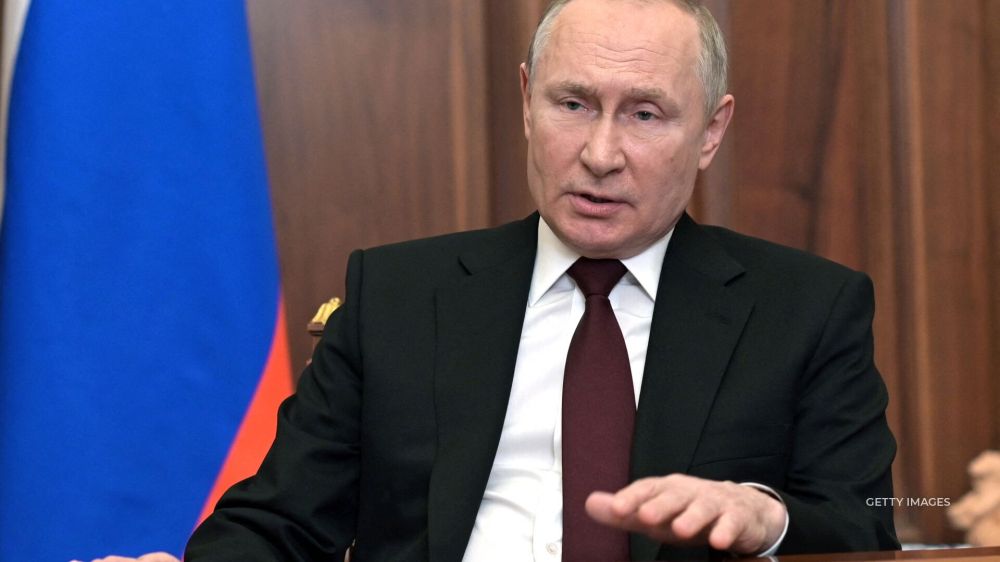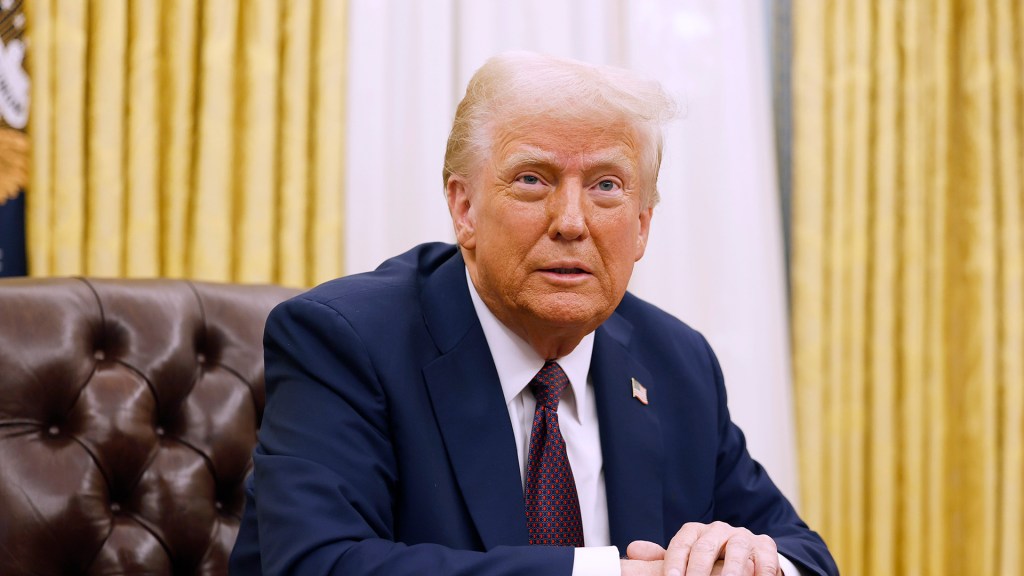In a public broadcast late February 21 (local time), Russian President Vladimir Putin gave a lengthy, moody speech about the status of relations between Russia and its neighbor, Ukraine. Putin in essence declared a formal cold war with the West, while also making clear his belief that an independent Ukraine should not exist – going so far as to erroneously claim the nation a creation of Lenin, and that he will do something about it.
Effective immediately, Putin formally recognized the two secessionist bits of Ukraine (Donetsk and Luhansk) that he has been supporting with special forces troops, weapons, intelligence, and air support for the past seven years. In his mind, they are now “independent countries” and “allies.”
This is the identical playbook to what Putin did in a couple of provinces of another former Soviet state – Georgia – back in the 2000s. The idea being that these Russian-created, Russian-funded, and Russian-armed statelets are “allies”; allies deserve Russian troops to “protect” them; and under Russian law such Russian deployments are empowered to attack territories adjacent to the new allies to secure allied interests. In 2008 similar Russian deployments led to a brief war which smashed the military of Georgia. Russian troops remain in Georgian territory today.
In case you’ve been living under a rock, the Russians have been steadily amassing multiple invasion forces on Ukraine’s borders for a couple of months now, with the most recent guesstimate of the force total approaching 200,000, the greatest concentration of focused military power the world has seen since the American invasion of Iraq in 2003. On a number of occasions, the Russians have claimed to be withdrawing forces, but civilian satellite monitoring has vividly illustrated that such “removed” troops have redeployed closer to the border. In the aftermath of today’s speech, multiple unconfirmed reports already indicate that Russian troops have moved into Donetsk and Luhansk.
Russia propaganda isn’t what it once was. In Soviet times it was often subtle, working through multiple intermediaries to provide rhetorical buffers, while also trickling into the conventional wisdom. It would seem to seep in from…everywhere. Now it’s just literally making up easily-disprovable stuff up on live television, and then moving on to the next blatant lie. About the only people who give it any credence are folks who have no choice (think: Belarusian President Alexander Lukashenko) or folks who have consciously blended the Russian lies into their own domestic ideological narratives (think: Nicaraguan President Daniel Ortega, US Senator Bernie Sanders, or Fox News Host Tucker Carlson). Even Chinese state media is giving the Russians a look that communicates, “Really? That’s what you’re going with?”
Russian leadership isn’t what it once was. Once it became clear in 1975 that Soviet Premier Leonid Brezhnev was little more than an occasionally shuffling corpse, real power shifted to the Soviet intelligence directorate, specifically KGB Chairman Yuri Andropov. This shouldn’t shock. The Soviet system existed in an information vacuum, so the people with the most power were those who actually knew what was real and what was propaganda. In time Andropov became Soviet premier, as did two of his acolytes: Konstantin Chernenko and Mikhail Gorbachev. And then the Soviet Union ended.
About the same time the KGBers took over, the Soviet Union went broke. The late-1970s and 1980s were a time of immense economic upheaval and near collapse (which preceded worse upheaval and actual collapse). One of the many ways the late-Soviet leadership attempted to square their failing circles was to reduce government spending. On everything. But most notably on education. Mass science and technical and manufacturing education in the Soviet Union in effect ended in the early 1980s. Russia is a pale shadow of the Soviet Union, and Russia never restarted mass educational efforts. Which means the last crop of Soviet KGB agents and leaders are the sole remaining pool of talent from which today’s Russian leadership can draw. Putin is 69. The youngest people who had completed their Soviet education before the bottom fell out are now 59. The average life expectancy for Russian males is 64.
The Russian strategic position is not what it was. The Russian heartlands are great wide opens. Defending great wide opens takes more troops than any country could supply. So, as Russian czar Catherine the Great famously put it, “I have no way to defend my borders but to extend them.” Extend them until they reach a physical feature that blocks invasion. Doing such would enable Russian troops to hunker down and plug the gaps between mountain and desert and sea.
At the height of Soviet power, the Russians controlled all nine of those geographic gaps that allow entry to the Russian heartlands. When the Soviet Union collapsed, Russia commanded but one. Courtesy of Putin’s wars of expansion and “peacekeeping” efforts in the former Soviet space, the Russians now have forces in six. Of the remaining gateways, two lie on Ukraine’s western border: the Polish and Bessarabian Gaps.
In my mind, the question was never “will” Russia invade Ukraine and attempt to absorb it in totality, but instead “when”. The Kremlin has been threatening Kiev for a decade now. My caution to today’s Russia watchers has been that there was little occurring which suggested this season’s round of Russian angst and anger was in any way unique.
Until today. Putin’s speech does more than merely suggest that Russia is ready to go.
Sanctions – real or imagined, in-place or threatened – will not shift Putin’s stance. For Russia, control of Ukraine isn’t simply seen as a birthright, but as an issue of national survival. The Russian population suffers so completely from drug abuse, alcoholism, malnutrition, and disease that it is the world’s fastest collapsing demography (although recent statistical updates suggest China is challenging Russia for the top spot). Patrolling Russia’s current borders is laughably beyond the capacity of Russia’s current population. But forward-positioning what troops remain in those gateways? That just might work. So, the Russians will try.
About the only would-be sanction which might – might – earn a blink from the Kremlin would be if the Europeans all swore off Russian oil and natural gas. That export line-item is far and away the Russian government’s largest money-maker, accounting for a hefty majority of income. But in doing so the Europeans would be cutting off their primary energy provider, condemning themselves to the dark and cold. And so that specific threat hasn’t happened. I’d be impressed – and shocked – if it did.
I’d be equally shocked if the fall of Ukraine were the end of the story. Ukraine is not a NATO ally. The West will not send regular troops to support Ukraine. That makes Ukraine – with its 45-million-strong population – the easy target. What assistance arrives will be designed to snarl the Russians in as painful and bloody of an occupation as possible. The real show – the real war – comes after. The two most important gateways to the Russian heartland remain: the Baltic Sea coast and the portion of the Polish gap that lies in, well, Poland. Unlike Ukraine, the countries in question here – Poland, Lithuania, Latvia and Estonia – are members of the NATO alliance. And of the European Union as well.
The Baltic beaches and the plains of Poland are where the future of Russia and the West, of the European Union and NATO, will ultimately be decided. It is there that Russia will succeed or die. This is far worse than it sounds. Russia’s population is in free-fall. A Russian occupation of Ukraine completed to Russia’s satisfaction will still absorb most of what’s left of Russia’s conventional military capabilities, leaving only the decidedly unconventional available for the next conflict.
Russia won’t fight its Twilight War with soldiers.

 Reuters
Reuters
 Getty Images
Getty Images
 Getty Images
Getty Images
 Getty Images
Getty Images
 Getty Images
Getty Images





















Latest Commentary
We know it is important to hear from a diverse range of observers on the complex topics we face and believe our commentary partners will help you reach your own conclusions.
The commentaries published in this section are solely those of the contributors and do not reflect the views of Straight Arrow News.
Dr. Frank Luntz
Pollster and Political Analyst‘Biased’: What Americans think of ‘mainstream media’
‘Getting rid of them’: Americans discuss Trump and immigration
‘Woke’: Why some Biden 2020 voters backed Trump in 2024